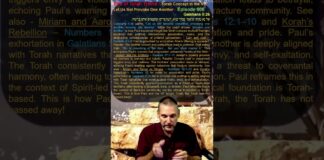In this week’s reading from Parashat Pinchas (Bamidbar / Numbers 25:10-26:51) the Lord speaks to Moshe saying that Pinchas, the son of Eleazar, has turned away His wrath from the sons of Yisrael because he was zealous for the Lord. Pinchas’ Jealousy for the Lord occurs in sefer Bamidbar / Numbers 25:7-9. Pinchas saw the sin of the sons of Yisrael and took action against a man of Yisrael in 25:8. While studying these Hebrew Scriptures, it is interesting that in 25:8 the expressions אֶל-הַקֻּבָּה and אֶל-קֳבָתָהּ are translated in the NASB as “into the tent” and “through the body,” respectively. This caught my attention because the word here is used and translated in two entirely differing ways being used in the same sentence. The first expression אֶל-הַקֻּבָּה is translated as “into the tent” in the KJV and NASB, “into the pavilion” in the RV version, “into the chamber” in the JPS, and “into the inner room” in the RSV. The second expression אֶל-קֳבָתָהּ is translated “through her belly” in the KJV, RV, and JPS bible versions. The word קֳבָתָהּ is from the root קבה meaning “stomach or belly” according to Brown-Drivers-Briggs Lexicon. The noun occurs in Devarim / Deuteronomy 18:3 and is translated as referring to the stomach of an ox or sheep. Here the noun is written in the feminine sense translated as “through her belly” (KJV) and is very interesting in regards to sin, specifically the sexual sin of the sons of Yisrael with the women of Moab that was accompanied with idolatry. How do these scriptures on Pinchas’ actions against the man and woman, coupled with the Hebrew word קבה translated as both tent and the belly, help us to understand sexual sin, and idolatry and the importance of walking in the spirit today? Read More here.








